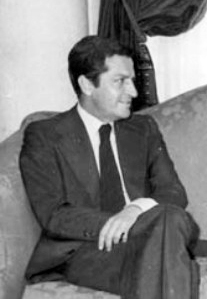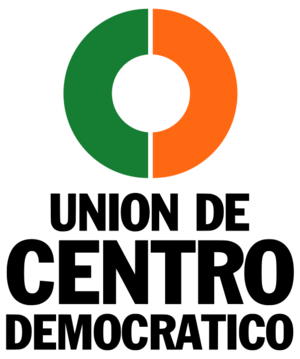Puedo prometer y prometo facts for kids

Puedo prometer y prometo is a famous Spanish phrase. It means "I can promise, and I do promise." Adolfo Suárez, a Spanish politician, first said it. He used it during the first general elections in Spain in 1977. These elections happened after the rule of Francisco Franco ended.
The phrase quickly became a symbol of the Spanish Transition. This was the time when Spain moved from a dictatorship to a democracy. People still use the phrase today in politics and news.
Contents
Spain's Path to Democracy
Caudillo Francisco Franco died on November 20, 1975. Two days later, Juan Carlos I became the King of Spain. The first government under King Juan Carlos I struggled to make Spain a democracy. Many people protested against it.
In July 1976, King Juan Carlos I chose Adolfo Suárez to be the Prime Minister. At first, not many people supported Suárez. But he worked to bring all democratic groups together. His goal was to turn Spain into a Western democracy.
New Laws for Change
To achieve this, the Political Reform Act was created in 1977. This was the last of the old laws from Franco's time. Suárez's government made changes, and the President of the Cortes Españolas, Torcuato Fernández-Miranda, supported it. People voted on this new law in 1976, and 94.1% approved it.
This new law allowed for general elections. They were set for June 15, 1977. To make sure the elections were truly democratic, several things happened. The Communist Party of Spain was made legal. Also, a law called the Spanish 1977 Amnesty Law was passed. This law forgave people for past political actions.
The Famous Speech
Fernando Ónega, who wrote speeches for Suárez, created the phrase "Puedo prometer y prometo." Adolfo Suárez, running for the Union of the Democratic Centre (Spain), used it in his final election speech. This speech was on June 13, 1977.
The speech was shown on RTVE, the national TV channel. It was the last election message before the vote. A song introduced Suárez, saying: "Vote center, vote Suárez, vote freedom. The sure path to democracy."
Suárez's Promises
Adolfo Suárez then appeared on screen. He first talked about promises he had already kept:
I believe that I am not coming to you with empty hands. We promised to give power back to the Spanish people, and tomorrow they will use it. We promised to make our political life normal. We promised to manage the change peacefully and build democracy from the law. We believe we have succeeded. We promised that all political groups could be in Parliament, and they can do it on Wednesday.
After talking about his past promises, Suárez used the phrase "I can promise, and I do promise..." to make new ones:
But if you give us your vote,
I can promise and I do promise that our government will take steps to solve our problems.
I can promise and I do promise to try to create a constitution with all groups in Parliament.
I can promise and I do promise to work hard to help the Spanish economy.
I can promise and I do promise that the Union of the Democratic Centre will make taxes fair. Those who have more will pay more.
I can promise and I do promise a legal plan for each region to have its own rules.
I can promise and I do promise that we will work honestly. You will be able to check what the government does.
I can, finally, promise and I do promise that our goal of a Spain for everyone will not be harmed by the desires of a few.
Lasting Impact

Many people believe that the phrase "I can promise and I do promise" was very important. It helped the Union of the Democratic Centre win the election. Some thought the Spanish Socialist Workers' Party might win instead.
Suárez made the UCD party feel strong because he used "I" in the phrase. He connected the party's success to himself. This was important because the party later became unstable after Suárez resigned in 1981.
See also
 In Spanish: Puedo prometer y prometo para niños
In Spanish: Puedo prometer y prometo para niños
 | Kyle Baker |
 | Joseph Yoakum |
 | Laura Wheeler Waring |
 | Henry Ossawa Tanner |

